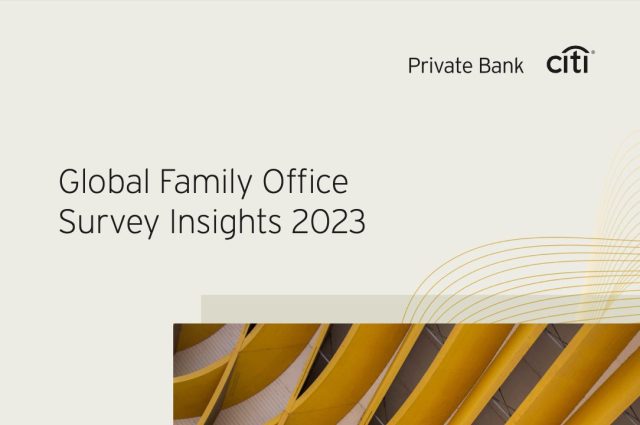Citi Global Family Office Insights 2023: 268 Single Family Offices with 86% 1st & 2nd Generation, 50% with More than $500 Million AUM, Top 3 Concerns are Inflation, Interest Rate Increases & US-China Relations, Asset Allocation – Equities 22%, Fixed Income 16%, Real Estate 14%, Cash Equivalents 12%, Private Equity Funds 12%
15th September 2023 | Hong Kong
Citi has released the Global Family Office Insights 2023, providing key insights into 286 single family offices worldwide (50% with AUM more than $500 million, 50% with AUM less than $500 million), of which 86% are 1st & 2nd generation family offices. In 2023 1st half, 77% of family offices with less than $500 million AUM employs 1 to 6 employees in the family office and 60% of family offices with more than $500 million employs 7 or more employees. The Top 5 family office economic concerns are Inflation, Interest rate increases, US-China relations, Stability of global financial system, Market volatility. The Top 5 Family Office Primary Focus are Wealth management services, investment management, Operating businesses, accounting, Fostering family unity & continuity. The Top 5 Families & Principals Primary Concerns are Preserving value of assets, Preparing next generation to be responsible wealth owners, Ensuring shared goals & vision for their future, Leadership transitions, Strengthening family governance. The Top 5 Services Performed Internally are Reporting, Accounting, Philanthropy, Investment management, Wealth planning. The Top 5 Family Office Primary Challenges are Adapting to changing market conditions, Meeting the needs & expectations of family members, Attracting & retaining talent, Implementing technology solutions, Navigating regulatory compliance. For Family Office Portfolio Management & Investments, family offices expected Portfolio Returns over next 12 months to Increase more than +10% (65%), Increase 0% to +10% (30%), No Change & Decrease (5%). The Top 5 Asset Class Allocation are Public equities 22%, Fixed income 16%, Real estate 14%, Cash & cash equivalents 12%, Private equity funds 12%. The Top 5 Asset Class Allocation by Region are North America 57%, Europe 16%, APAC ex-China 11%, China 8%, Latin America 7%. Top 5 Asset Class Family Office Most Bullish – Developed investment grade fixed income 45%, Private credit 44%, Private equity direct 38%, Cash 34%, Private equity funds / funds of funds 32%. Top 5 Asset Class Family Office Most Bearish – Crypto assets 49%, Real estate 32%, Developed corporate high yield fixed income 27%, Emerging market fixed income 25%, Hedge funds 25%. Top 5 Increase in Sector Allocation for next 12 months – Technology 69%, Healthcare 58%, Energy 28%, Real estate 28%, Financials 27%. Top 5 Private Equity Allocation – Growth equity 30%, Venture capital 27%, Buyout 19%, Funds of funds 8%, Secondary 6%. Direct Investments – Yes 80%, No 20%. Top 5 Deal Flow Source – Internal team 51%, Other families or family offices 49%, Networking groups / investments clubs 36%, Investment advisors 24%, Banks 21%. Top 5 Direct Investing Preferred Sector – Technology 63%, Real estate 42%, Healthcare 40%, Consumer goods 29%, Financials 23%. Sustainable Investment Allocation – Yes 72%, No 28%. Portfolio Assets Managed In-house vs outsourced – Managed in-house 61%, External investment managers 39%. Have Investment Committee – Yes 64%, Working on it 10%, None 26%. Top 5 Philanthropic Focus – Education, Healthcare & medical research, Arts, Civil & societal benefit, Youth development. (AUM ~ Assets under Management) View key findings & summary below | View report here
“ Citi Global Family Office Insights 2023: 268 Single Family Offices with 86% 1st & 2nd Generation, 50% with More than $500 Million AUM, Top 3 Concerns are Inflation, Interest Rate Increases & US-China Relations, Asset Allocation – Equities 22%, Fixed Income 16%, Real Estate 14%, Cash Equivalents 12%, Private Equity Funds 12% “
Citi Global Family Office Insights 2023

Citi has released the Global Family Office Insights 2023, providing key insights into 286 single family offices worldwide (50% with AUM more than $500 million, 50% with AUM less than $500 million), of which 86% are 1st & 2nd generation family offices.
268 family offices:
- APAC – 21%
- Europe & MENA – 25%
- North America – 34%
- Latin America – 25%
AUM (Assets under Management):
- More than $500 million AUM – 50%
- Less than $500 million AUM – 50%
Family Office Generation:
- 1st generation – 56%
- 2nd generation – 30%
- 3rd generation – 10%
- 4th generation onwards – 4%
Family Offices with less than $500 million AUM:
- 1 to 3 employees – 47%
- 4 to 6 employees – 30%
- 7 to 9 employees – 11%
- >10 employees – 12%
Family Offices with more than $500 million AUM:
- 1 to 3 employees – 23%
- 4 to 6 employees – 16%
- 7 to 9 employees – 19%
- >10 employees – 41%
Summary
- Single Family Offices – 268 (50% with >$500 million AUM, 50% with < $500 million AUM)
- Family Office Generation – 1st generation 56%, 2nd generation 30%, 3rd generation 10%, 4th generation onwards 4% (86% are 1st & 2nd generation family offices)
- No. of Employees in family offices with less than $500 million – 77% with 1 to 6 employees
- No. of Employees in family offices with more than $500 million – 60% with 7 or more employees
- Top 5 family office economic concerns – Inflation, Interest rate increases, US-China relations, Stability of global financial system, Market volatility
- Top 5 APAC family office economic concerns – US-China relations, Inflation, Stability of global financial system, Interest rate increases, Market volatility
- Top 5 Family Office Primary Focus – Wealth management services, investment management, Operating businesses, accounting, Fostering family unity & continuity
- Top 5 Families & Principals Primary Concerns – Preserving value of assets, Preparing next generation to be responsible wealth owners, Ensuring shared goals & vision for their future, Leadership transitions, Strengthening family governance
- Top 5 Services Performed Internally – Reporting, Accounting, Philanthropy, Investment management, Wealth planning
- Top 5 Family Office Primary Challenges – Adapting to changing market conditions, Meeting the needs & expectations of family members, Attracting & retaining talent, Implementing technology solutions, Navigating regulatory compliance
Summary – Family Office Portfolio Management & Investments
- Portfolio Change 2023 1st Half – Increase 67%, No Change 7%, Decrease – 26%
- Expected Portfolio Returns over next 12 months – Increase more than +10% (65%), Increase 0% to +10% (30%), No Change & Decrease (5%)
- Top 5 Asset Class Allocation – Public equities 22%, Fixed income 16%, Real estate 14%, Cash & cash equivalents 12%, Private equity funds 12%
- Top 5 Asset Class Allocation by Region – North America 57%, Europe 16%, APAC ex-China 11%, China 8%, Latin America 7%
- Amount of Leverage Used – No leverage 48%, Less than 10% leverage – 25%
- Top 5 Asset Class Family Office Most Bullish – Developed investment grade fixed income 45%, Private credit 44%, Private equity direct 38%, Cash 34%, Private equity funds / funds of funds 32%
- Top 5 Asset Class Family Office Most Bearish – Crypto assets 49%, Real estate 32%, Developed corporate high yield fixed income 27%, Emerging market fixed income 25%, Hedge funds 25%
- Top 5 Increase in Sector Allocation for next 12 months – Technology 69%, Healthcare 58%, Energy 28%, Real estate 28%, Financials 27%
- Top 5 Private Equity Allocation – Growth equity 30%, Venture capital 27%, Buyout 19%, Funds of funds 8%, Secondary 6%
- Direct Investments – Yes 80%, No 20%
- Top 5 Deal Flow Source – Internal team 51%, Other families or family offices 49%, Networking groups / investments clubs 36%, Investment advisors 24%, Banks 21%
- Deal Size Range – More than $10 million 14%, $1 million to $10 million 73%, Less than $1 million 13%
- Top 5 Investing Stage Preference – Early stage (Series A or B) 56%, Growth (Series C or D) 55%, Pre-IPO 32%, Start-up / incubation / seed funding 25%, Secondary transactions 23%
- Majority vs Minority Investing – Controlling with more than 50% shares – 78%, Minority with less than 50% shares – 22%
- Top 5 Direct Investing Preferred Sector – Technology 63%, Real estate 42%, Healthcare 40%, Consumer goods 29%, Financials 23%
- Sustainable Investment Allocation – Yes 72%, No 28%
- Top 5 Preferred Investment Types for Sustainable Investment – Private equity funds, Public equity, Direct private investment, Venture capital, Real estate
- Top 5 Preferred Investment Themes for Sustainable Investment – Climate transition solutions, Agricultural solutions & food security, Cybersecurity & data protection solutions, Healthcare, Education
- Portfolio Assets Managed In-house vs outsourced – Managed in-house 61%, External investment managers 39%
- Investment Committee – Yes 64%, Working on it 10%, None 26%
- Top 5 Philanthropic Focus – Education, Healthcare & medical research, Arts, Civil & societal benefit, Youth development
Citi Global Family Office Insights 2023
1) Family Office Top Concerns
Top 7 Economic Concerns – Global:
- Inflation – 56%
- Interest rate increases – 51%
- US-China relations – 48%
- Stability of global financial system – 38%
- Market volatility – 34%
- Russia-Ukraine war – 24%
- Currency risk – 7%
Top 7 Economic Concerns – APAC:
- US-China relations – 64%
- Inflation – 50%
- Stability of the global financial system – 48%
- Interest rate increases – 42%
- Market volatility – 34%
- Russia-Ukraine war – 26%
- Currency risk – 8%
2) Family Office Purpose
Family Office Primary Focus:
- Typical wealth management services – 74%
- Mainly investment management – 55%
- Operating business(es) – 28%
- Mainly accounting – 23%
- Fostering family unity & continuity – 21%
- Philanthropy – 18%
Family Office 1st Generation Primary Focus:
- Typical wealth management services – 78%
- Mainly investment management – 50%
- Operating business(es) – 30%
- Philanthropy – 24%
- Mainly accounting – 23%
- Fostering family unity and continuity – 19%
Family Office 4th Generation Primary Focus:
- Typical wealth management services – 63%
- Mainly investment management – 63%
- Mainly accounting – 50%
- Operating business(es) – 25%
- Fostering family unity and continuity – 25%
- Philanthropy – 25%
Top 7 Families & Principals Primary Concerns:
- Preserving value of assets – 68%
- Preparing next generation to be responsible wealth owners – 60%
- Ensuring shared goals & vision for their future – 52%
- Leadership transitions – 24%
- Strengthening family governance – 23%
- Enhancing philanthropic impact – 18%
- Managing family spending – 10%
3) Citi Investment Forecast
Citi Strategic Return Estimates:
- Developed market equities: +7%
- Emerging market equities: +12.9%
- Investment grade fixed income: +4.6%
- High yield fixed income: +7.4%
- Emerging market fixed income: +7.8%
- Cash: +3.4%
- Hedge funds: +9.1%
- Private equity: +17.6%
- Real estate: +10.6%
- Commodities: +2.4%
4) Family Office Asset Allocation
Asset Class Allocation:
- Public equities – 22%
- Fixed income – 16%
- Real estate – 14%
- Cash & cash equivalents – 12%
- Private equity funds – 12%
- Private equities direct – 10%
- Hedge funds – 4%
- Real estate fund – 3%
- Private credit – 3%
- Art – 2%
- Commodities – 1%
- Others – 1%
Asset Class Allocation by Region:
- North America – 57%
- Europe – 16%
- APAC ex-China – 11%
- China – 8%
- Latin America – 7%
- Middle East & Africa – 1%
Holds Concentrated Position in Public or Private Companies:
- Yes – 66%
- No – 34%
Amount of Leverage Used:
- No leverage – 48%
- Less than 10% – 25%
- 10% to 20% – 11%
- 20% to 30% – 10%
- More than 30% – 6%
Asset Allocation Increase – Global vs APAC:
- Fixed Income – 51% vs 43%
- Cash – 47% vs 54%
- Private Equity – 38% vs 26%
- Real Estate – 29% vs 26%
- Public Equity – 20% vs 34%
Asset Allocation Decrease – Global:
- Fixed Income – 10%
- Cash – 24%
- Private Equity – 11%
- Real Estate – 15%
- Public Equity – 38%
Asset Allocation No Change – Global:
- Fixed Income – 39%
- Cash – 29%
- Private Equity – 51%
- Real Estate – 56%
- Public Equity – 42%
5) Asset Class – Most Bullish or Bearish
Asset Class Family Office – Bullish:
- Developed investment grade fixed income – 45%
- Private credit – 44%
- Private equity direct – 38%
- Cash – 34%
- Private equity funds / funds of funds – 32%
- Real estate – 25%
- Global developed equities – 24%
- Emerging market equities – 24%
- Hedge funds – 21%
- Developed corporate high yield fixed income – 21%
- Commodities – 20%
- Emerging market fixed income – 20%
- Art – 19%
- Crypto assets – 8%
Asset Class Family Office Outlook – Bearish:
- Crypto assets – 49%
- Real estate – 32%
- Developed corporate high yield fixed income – 27%
- Emerging market fixed income – 25%
- Hedge funds – 25%
- Global developed equities – 22%
- Emerging market equities – 21%
- Private equity funds / funds of funds – 20%
- Commodities – 16%
- Private equity direct – 15%
- Private credit – 14%
- Art – 14%
- Developed investment grade fixed income – 11%
- Cash – 7%
Asset Class Outlook by AUM (less than $500 million) – Bullish:
- Developed investment grade fixed income – 42%
- Private equity direct – 36%
- Cash – 33%
- Private credit – 31%
- Private equity funds / funds of funds – 29%
- Emerging market equities – 28%
- Global developed equities – 26%
- Commodities – 22%
- Emerging market fixed income – 21%
- Real estate – 21%
- Developed corporate high yield fixed income – 17%
- Hedge funds – 15%
- Art – 20%
- Crypto assets – 10%
Asset Class Outlook AUM (more than $500 million) – Bullish:
- Private credit – 55%
- Developed investment grade fixed income – 48%
- Private equity direct – 40%
- Cash – 35%
- Private equity funds / funds of funds – 32%
- Real estate – 28%
- Hedge funds – 26%
- Global developed equities – 22%
- Emerging market equities – 21%
- Developed corporate high yield fixed income – 24%
- Art – 19%
- Commodities – 18%
- Emerging market fixed income – 18%
- Crypto assets – 5%
Increased Sector Allocation for next 12 months:
- Technology – 69%
- Healthcare – 58%
- Energy – 28%
- Real estate – 28%
- Financials – 27%
- Industrials – 20%
- Consumer goods – 16%
- Materials – 9%
6) Family Office Portfolio Returns
Portfolio Change (2023 Jan to June):
- Increase – 67%
- No Change – 7%
- Decrease – 26%
Portfolio Change (2023 Jan to June):
- Increase more than 20% – 4%
- Increase 10% to 20% – 7%
- Increase 0% to 10% – 56%
- No Change – 7%
- Decrease 0% to 10% – 14%
- Decrease 10% to 20% – 9%
- Decrease more than 20% – 3%
Expected Portfolio Returns over next 12 months:
- Increase more than 10% – 65%
- Increase 0% to 10% – 30%
- No Change – 3%
- Decrease – 2%
Expected Portfolio Returns over next 12 months:
- Increase > 15% – 12%
- Increase 10% to 15% – 53%
- Increase 5% to 10% – 25%
- Increase 0% to 5% – 5%
- No Change – 3%
- Decrease 0% to 5% – 1%
- Decrease 5% to 10% – 0%
- Decrease 10% to 15% – 1%
- Decrease > 15% – 0%
7) Private Equity, Direct Investing & Deal flow
Private Equity Allocation:
- Growth equity – 30%
- Venture capital – 27%
- Buyout – 19%
- Funds of funds – 8%
- Secondary – 6%
- Hybrid – 4%
- Distressed – 4%
- Mezzanine – 2%
Direct Investments:
- Yes – 80%
- No – 20%
Direct Investing Strategy Adjustments:
- Find Opportunistic deals based on attractive terms or valuations – 66%
- Paused new direct investments due to economic uncertainty – 38%
- Strengthen due diligence process – 29%
- Review financial and milestone updates from existing portfolio companies – 18%
- Additional capital to support existing portfolio companies – 15%
- No change – 10%
- Seek opportunities to divest some portfolio companies – 0%
Source of Deal Flow:
- Internal team – 51%
- Other families or family offices – 49%
- Networking groups / investments clubs – 36%
- Investment advisors – 24%
- Banks – 21%
- Other – 5%
Deal Size:
- More than $10 million – 14%
- $5 million to $10 million – 19%
- $2.5 million to $5 million – 23%
- $1 million to $2.5 million – 31%
- Less than $1 million – 13%
Investing Stage Preference:
- Early stage (Series A or B) – 56%
- Growth (Series C or D) – 55%
- Pre-IPO – 32%
- Start-up / incubation / seed funding – 25%
- Secondary transactions – 23%
- Leveraged buyouts – 19%
Majority vs Minority Investing:
- Controlling with > 50% – 78%
- Minority with < 50% – 22%
Direct Investing Preferred Sector:
- Technology – 63%
- Real estate – 42%
- Healthcare – 40%
- Consumer goods – 29%
- Financials – 23%
- Energy – 19%
- Industrials – 18%
- Materials – 9%
8) Sustainable Investment
Sustainable Investment Allocation:
- Yes – 72%
- No – 28%
Sustainable Investment Allocation:
- More than 50% – 6%
- 25% to 50% – 3%
- 10% to 25% – 24%
- Less than 10% – 39%
- None – 28%
Reasons why increasing allocation to Sustainable Investment:
- Sustainable investment opportunities with competitive financial performance – 51%
- Nothing at this time – 37%
- Support to find suitable investment opportunities – 24%
- Improved reporting on investment performance and impact – 22%
- Additional information or education about sustainable investing – 14%
- Support to address the resistance from some family members – 3%
Preferred Investment Types for Sustainable Investment:
- Private equity funds – 53%
- Public equity – 39%
- Direct private investment – 34%
- Venture capital – 21%
- Real estate – 15%
- Fixed income – 12%
- Blended finance – 7%
- None of the above – 22%
Preferred Investment Themes for Sustainable Investment:
- Climate transition solutions – 37%
- Agricultural solutions & food security – 37%
- Cybersecurity & data protection solutions – 29%
- Access to healthcare – 29%
- Access to education – 22%
- Circular economy – 15%
- Access to clean water & sanitation – 14%
- Diversity, equity & inclusion – 12%
- Affordable housing – 12%
- Biodiversity & natural capital – 6%
- None of the above – 24%
9) Family Office Investment Structure
Portfolio Assets Managed In-house vs outsourced:
- Managed in-house – 61%
- Managed by external investment managers – 39%
Investment Function – Yes:
- Investment Committee – 64%
- Investment Policy Statement (IPS) – 51%
- 3rd party software for consolidated reporting – 43%
Investment Function – Working on it:
- Investment Committee – 10%
- Investment Policy Statement (IPS) – 15%
- 3rd party software for consolidated reporting – 10%
Investment Function – None:
- Investment Committee – 26%
- Investment Policy Statement (IPS) – 34%
- 3rd party software for consolidated reporting – 47%
10) Philanthropy
Philanthropic Focus:
- Education – 67%
- Healthcare & medical research – 40%
- Arts – 33%
- Civil & societal benefit – 29%
- Youth development – 20%
- Environment – 18%
- Food, agriculture & nutrition – 13%
- Human services – 10%
- Disaster preparedness & relief – 5%
- Public safety – 2%
Purpose of Philanthropy:
- Engaging the next generation & planning philanthropy leadership succession – 38%
- Integrating philanthropy as part of the greater wealth planning strategy – 34%
- Networking with like-minded funders – 28%
- Enhancing strategic development of philanthropy – 27%
- Understanding the advantages & drawbacks of various giving vehicles – 27%
- Accessing shared learning opportunities – 25%
- Leveraging organisational best practices for philanthropic entities – 24%
- Getting programmatic support – 20%
11) Cybersecurity
Cybersecurity Management – Yes & Working on it:
- Training the family office staff – 78%
- Establishing security policies & procedures – 73%
- Upgrading legacy systems – 71%
- Conducting cybersecurity risk assessments – 71%
- Educating family members – 67%
- Purchasing cybersecurity insurance – 32%
12) Managing Family Office
Family Office Services – Performed Internally:
- Reporting – 69%
- Accounting – 59%
- Philanthropy – 52%
- Investment management – 45%
- Wealth planning – 44%
- Lifestyle management – 42%
- Family education – 29%
- Trusteeship – 23%
- Tax – 23%
Family Office Services – Both Internal & External:
- Tax – 73%
- Investment management – 53%
- Trusteeship – 47%
- Wealth planning – 41%
- Accounting – 35%
- Reporting – 28%
- Family education – 28%
- Philanthropy – 16%
- Lifestyle management – 10%
Family Office Services – None:
- Lifestyle management – 48%
- Family education – 43%
- Philanthropy – 32%
- Trusteeship – 30%
- Wealth planning – 15%
- Accounting – 6%
- Tax – 4%
- Reporting – 3%
- Investment management – 2%
Family Office Structure – Yes:
- Separate from family business – 70%
- Clear processes & internal controls – 66%
- Governing board – 48%
- Formal strategic plan – 41%
- Formal risk management plan – 36%
- Leadership succession plan – 31%
- Client service agreement – 30%
Family Office Structure – Working on it:
- Separate from family business – 12%
- Clear processes & internal controls – 25%
- Governing board – 19%
- Formal strategic plan – 29%
- Formal risk management plan – 32%
- Leadership succession plan – 35%
- Client service agreement – 13%
Family Office Structure – None:
- Separate from family business – 18%
- Clear processes & internal controls – 9%
- Governing board – 33%
- Formal strategic plan – 30%
- Formal risk management plan – 32%
- Leadership succession plan – 34%
- Client service agreement – 57%
Professionalisation of Family Office – Yes:
- Family constitution or charter is in place – 32%
- Family retreat is organized annually – 30%
- Family leadership succession plan is in place – 28%
- Family has an education program for the next generation – 21%
Professionalisation of Family Office – Working on it:
- Family constitution or charter is in place – 17%
- Family retreat is organized annually – 11%
- Family leadership succession plan is in place – 31%
- Family has an education program for the next generation – 16%
Professionalisation of Family Office – No:
- Family constitution or charter is in place – 51%
- Family retreat is organized annually – 59%
- Family leadership succession plan is in place – 41%
- Family has an education program for the next generation – 63%
Internationalisation of Family Office:
- Some assets in multiple countries – 55%
- Some family members with different or multiple citizenships / passports, or reside in other countries – 52%
- Family is not international – 29%
- Some family members planning to move to different countries or changing citizenships in the near term – 18%
Family Office Primary Challenges:
- Adapting to changing market conditions – 52%
- Meeting the needs & expectations of family members – 50%
- Attracting & retaining talent – 39%
- Implementing technology solutions – 29%
- Navigating regulatory compliance – 27%
- Managing costs – 26%
- Maintaining confidentiality & privacy – 14%
- Networking with peers – 14%
Family Office Cost Control:
- Increase productivity by investing in technology – 45%
- Insource some activities more efficiently done in-house – 41%
- Outsource some low value-added activities – 34%
- Outsource some activities requiring extensive expertise – 25%
- Reassess the competitiveness of current service providers – 23%
- Reduce the scope of services offered to family members – 6%
- None – 22%
Citi Private Bank Global Family Office Group
Citi Private Bank’s Global Family Office Group serves single family offices, private investment companies and private holding companies, including family-owned enterprises and foundations, around the world.
The 2023 Survey
Our 2023 survey was initiated during Citi Private Bank’s 2023 Family Office Leadership Program on June. The survey was subsequently released to family office clients globally and was open for input until August 9. The survey included over 40 questions aimed at understanding the investment sentiment, portfolio actions and family office operations of clients in 2023. It drew responses from 268 participants. Family office respondents identified the primary geographic location of their family office. 21% of responses were from Asia Pacific, 25% of responses were from Europe, the Middle East and Africa, 20% of responses were from Latin America and 34% of responses were from North America.
268 family offices:
- APAC – 21%
- Europe & MENA – 25%
- North America – 34%
- Latin America – 25%
AUM (Assets under Management):
- More than $500 million AUM – 50%
- Less than $500 million AUM – 50%
Family Office Generation:
- 1st generation – 56%
- 2nd generation – 30%
- 3rd generation – 10%
- 4th generation onwards – 4%
Family Offices with less than $500 million AUM:
- 1 to 3 employees – 47%
- 4 to 6 employees – 30%
- 7 to 9 employees – 11%
- >10 employees – 12%
Family Offices with more than $500 million AUM:
- 1 to 3 employees – 23%
- 4 to 6 employees – 16%
- 7 to 9 employees – 19%
- >10 employees – 41%
Sign Up / Register
Caproasia Users
- Manage $20 million to $3 billion of assets
- Invest $3 million to $300 million
- Advise institutions, billionaires, UHNWs & HNWs
Caproasia Platforms | 11,000 Investors & Advisors
- Caproasia.com
- Caproasia Access
- Caproasia Events
- The Financial Centre | Find Services
- Membership
- Family Office Circle
- Professional Investor Circle
- Investor Relations Network
Monthly Roundtable & Networking
Family Office Programs
The 2025 Investment Day
- March - Hong Kong
- March - Singapore
- July - Hong Kong
- July - Singapore
- Sept- Hong Kong
- Sept - Singapore
- Oct- Hong Kong
- Nov - Singapore
- Visit: The Investment Day | Register: Click here
Caproasia Summits
- The Institutional Investor Summit
- The Investment / Alternatives Summit
- The Private Wealth Summit
- The Family Office Summit
- The CEO & Entrepreneur Summit
- The Capital Markets Summit
- The ESG / Sustainable Investment Summit



































